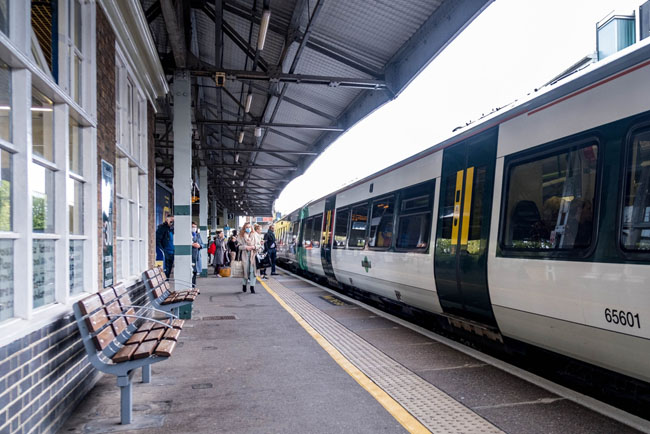Taxpayers forked out four-fifths of the £21bn cost of running Britain’s railways as fare revenue fell by £8.6bn from the previous year due to lockdowns and other impacts of the pandemic.
The Office of Rail and Road (ORR) has published its Rail Industry Finance (UK) 2020-21 report, which shows the income, expenditure, and government funding of the UK rail industry for the financial year 1 April 2020 to 31 March 2021.

Platform 1 at Epsom Rail Station, November 2021
The ORR pointed out that the industry was substantially affected by the pandemic during the year, with passenger journeys falling to historically low levels and the Government using emergency measures – a large increase in train operator subsidy – to keep services running.
As a whole, the industry received £20.7bn in 2020-21, which was funded through fares and other passenger income (£2.5bn), government (£16.9bn) and other sources (£1.3bn).
The £16.9bn government funding represented an increase of £10.4bn on the previous year and resulted largely from an £8.6bn drop in fares income to just £1.8bn. The number of passenger journeys reduced by 77.7% in 2020-21.
Despite the industry running 20.9% fewer services in 2020-21 its expenditure rose £0.8bn to £21.0 bn.
The ORR said the pandemic increased expenditure in areas such as the cost of personal protective equipment, cleaning costs and staff absences.
It added that the industry has started to recover from the pandemic. In October it reported that in the first quarter of 2021-22 (April to June 2021) 182 million rail passenger journeys were made in Great Britain, which was more than five times the 35 million journeys made in the first quarter of 2020-21.
Responding to media reports that train operating companies are under pressure to cut costs and services, a spokesperson for the Rail Delivery Group said: ‘With passenger numbers still at only two thirds of pre-pandemic levels, it’s important to ensure that the railway isn’t taking more than its fair share from the taxpayer. Putting the rail industry on a sound financial footing now will help to secure a bright future.
‘With rail passengers spending £133bn a year pre-pandemic on things like shopping, eating out and weekends away, train travel is going to be vital to the economic recovery and, with their track record of doubling passengers, private operators are well placed to strike the right balance between running trains efficiently and offering a great service that gets people back travelling.’
Register now for full access
Register just once to get unrestricted, real-time coverage of the issues and challenges facing UK transport and highways engineers.
Full website content includes the latest news, exclusive commentary from leading industry figures and detailed topical analysis of the highways, transportation, environment and place-shaping sectors.
Use the link below to register your details for full, free access.
Already a registered? Login